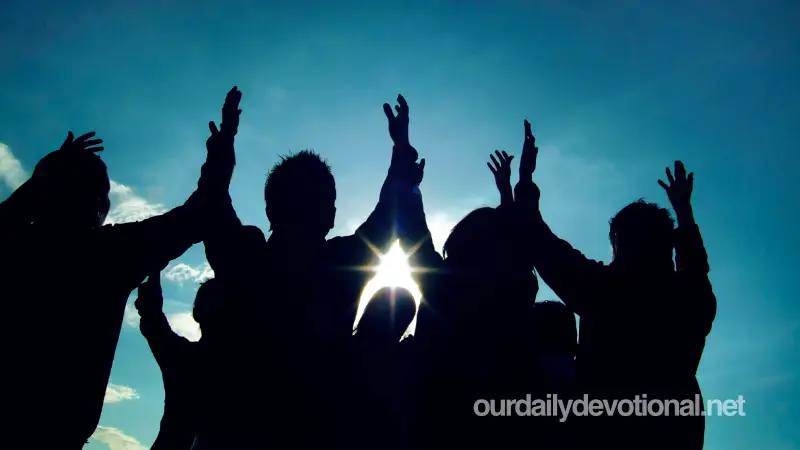Josephus coined this term to define the government instituted at Sinai: "Our lawgiver... ordained that our government would be what I will designate by the expressive term of theocracy: God exercising authority" (Against Apion 2:17).
Jehovah, the head of the nation, sat between the cherubim (Ex. 25:22). He held legislative, executive and judicial authority.
He had made known to the people the fundamental Law of the State, and raised up men capable of governing in his name.
There were judges who fulfilled most of the judicial functions, and only the most difficult problems to resolve were presented directly before the Lord (Ex. 18:19).
God exercised legislative authority through Moses and the prophets (Deut. 18:15-19), but the given Law rarely required modifications or additions.
As for executive functions, they were entrusted to leaders called Judges. Raised when their need was felt, these men showed themselves worthy of the confidence of the people, and assumed the direction of affairs.
God made obedience the basis of the theocratic regime he proposed to Israel at Sinai (Ex. 19:4-9). The elders accepted this condition (Ex. 19:7, 8).
Jehovah made the Decalogue, the very basis of the Covenant, resonate in the ears of the Israelites (Ex. 20:1, 19, 22; Deut. 4:12, 33, 36; 5:4, 22; Ex. 19:9 ).
The people, overcome with fear, asked that the rules that came from the Ten Commandments not be given directly to them, but through Moses (Ex. 20:18-21).
The pact was ratified. Moses wrote all the words of Jehovah in a book, erected an altar and twelve pillars, ordered a sacrifice to be offered, and sprinkled half of the blood of the slain animals on the altar.
He read the book of the covenant to the people, and they all agreed to obey Jehovah. Moses then sprinkled the rest of the blood on the people, saying, "Behold the blood of the covenant which the Lord has made with you concerning all these things" (Ex. 24:3-11; see COVENANT). The pact had been established.
The Decalogue, the fundamental law of the State, would receive the name "constitution" today. It was a past covenant between God and the community of Israel.
The basic principles were engraved on two stone tablets placed in the ark. This constitution was called the "Tables of the Covenant" (Deut. 4:13; 9:9, 11; 1 Kings 9:9-21; cf. Num. 10:33; Judges 20:27; 1 Sam. 4:3), or of "testimony" (Ex. 31:18; 32:15, etc.).
The norms derived from the Decalogue are never contrary to them. They are its application to everyday life.
These statutes, grouped orderly, especially ten by ten or five by five, form a code in which the term "If" frequently marks the beginning of the subdivisions.
Essential sections:
(a) Laws relating to the altar and worship (Ex. 20:23-26).
(b) Laws safeguarding the rights of men:
freedom (Ex. 21:2-11);
voluntary and accidental homicide (Ex. 21:12-32);
damage caused to property (Ex. 21:3-22:15).
(c) Statutes relating to individual conduct (Ex. 22:1-23:9).
(d) Concerning Ordinances:
to the sabbatical year and day,
to the parties,
the sacrifices (Ex. 23:10-19).
(e) Promises (Ex. 23:20-33).
As to the date, character, and codification of these ordinances, see MOSES.
As for the later modifications and additions, with a view to sedentary life in the Promised Land, which required modifications in some of the laws promulgated for pilgrimage in the desert.
Since the institution of the theocracy at Sinai, the people knew that God governed them through Moses, charged by Him to exercise legislative, judicial and executive powers.
There were already junior judges helping Moses (Ex. 18:21-26). At the end of the wilderness wandering, the Israelites received the promise that God would continue to reveal his will to them (Deut. 18:15-19).
Moses announced to them that God would provide for his succession, but that a day would come when the people themselves would ask to have a king like all the other nations (Deut. 17: 14-20).
The maintenance of the theocracy depended, in effect, on Israel's attitude toward God and toward the covenant. The Israelites formed twelve tribes linked by ties of blood, language and common history, and the hope of enjoying freedom in their own territory; All this contributed to uniting them; But it is indisputable that the fact of being grouped under the same theocratic authority represented for them the most powerful of ties.
It was after Jehovah immediately ceased to reign over them that the tendencies toward schism became manifest (1 Sam. 10:27; 2 Sam. 2:8-10; 3:1; 15:10; 17:24 ; 19:9-10, 41-20:22; 1 Kings 12:16-19).
At the moment when the nation claimed a ruler from among its own, the Lord expressly said to Samuel: "They have not rejected you, but they have rejected me, from reigning over them" (1 S. 8:7 cf. 1 Sam. 10:19; 12:12).
Thus ended the true theocracy in Israel. However, God did not abandon the chosen people or his plans for them.
Out of sheer condescension, God gave them Saul (1 Sam. 9:15-17; 10:22-24; 12:13, 22), then David (1 Sam. 16:1, 12-13), the man according to his heart (1 Sam. 13:14). There followed, at least under the best kings, a kind of semi-emocratic regime.
But it was nothing more than an unsatisfactory and provisional state. Through his prophets (including David himself), the Lord announced the coming of the Messiah-King, who would establish the perfect theocracy, in accordance with his eternal plan (1 Sam. 25:7, 12-13, 16; Ps. 2; 45:7-8; 72:1-11; Is. 9:5-6; 11:1-10, etc.).
The glorious reign of the Millennium will be the Lord's last word on earth (Rev. 20:1-10) leading to the manifestation of His eternal kingdom in heaven.
Meaning of THEOCRACY
Josephus coined this term to define the government instituted at Sinai: "Our lawgiver... ordained that our government would be what I will designate by the expressive term of theocracy: God exercising authority" (Against Apion 2:17).







